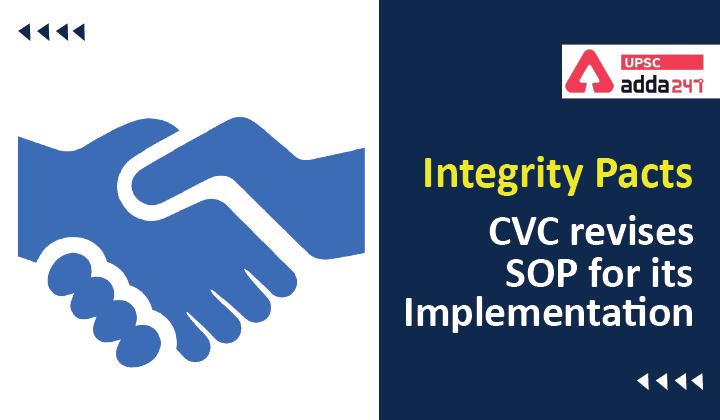Table of Contents
Integrity pacts: Relevance
- GS 2: Government policies and interventions for development in various sectors and issues arising out of their design and implementation.
Integrity pact UPSC: Context
- Recently, the Central Vigilance Commission (CVC) has revised the Standard Operating Procedure (SOP) for adopting and implementing the Integrity Pact to provide a larger pool of Independent External Monitors (IEMS) for examining government contracts.
Integrity pact CVC: Key changes
- The SOP was first revised in June 2021, which the SOP has been revised for the second time in eight months.
- As per the recent change, the IEMs will only be picked from a panel of eminent persons/officers who have held the post of additional secretary or equivalent or any other position at a higher pay scale in the government of India at the time of retirement.
- IEMs are appointed by the apex vigilance body to look into issues relating to execution of contract(s) and any irregularities
- The June 2021 revision only considered officials at the rank of secretary to government of India, chief secretaries in the states or officials at equivalent pay scale at the time of retirement.
- The latest SOP has also removed retired director generals of police from the list of eminent persons to be considered for IEMs.
- For retired officers of armed officers, too, only those officers equivalent to the ranks of additional secretaries or higher in the government of India will now be eligible to become IEMs.
- Earlier, this was allowed only for officers in apex pay scale.
Integrity pact meaning
- The Integrity Pact establishes mutual contractual rights and obligations to reduce the high cost and effects of corruption.
- According to 2nd ARC, Integrity pacts are agreement between public agencies involved in procurement of goods and services and the bidder for a public contract to the effect that the bidder will not pay any illegal gratification to secure the contract.
Integrity pacts in India
- In India, Integrity Pact (IP) was adopted for the first time in 2006.
- The Second Administrative Reforms Commission (ARC) in its IV Report on Ethics in Governance made the recommendation for IP’s adoption in order to make contracting process more transparent.
- IP implementation got a real boost after the Central Vigilance Commission (CVC) issued its first circular in 2007 recommending the adoption of Integrity Pact in all major procurements of central Public Sector Undertakings.
- CVC is the nodal agency for implementation of Integrity Pact in the country.
- Once a Public Sector Undertaking adopts Integrity Pact, it is mandatory to include IP in all the contracts above the threshold value.
Integrity Pact advantages
- IPs establishes a level playing field: The IP enables companies to abstain from bribing by providing them with assurances that their competitors will also refrain from bribing.
- In addition, they can feel confident that government procurement, privatisation or licensing agencies also commit to preventing corruption (including extortion) by their officials and to following transparent procedures.
- Enables governments to gather and mobilise public support for the government’s own procurement, privatisation and licensing programmes and to avoid the high cost in trust and reputation attached to occurrences of corruption in highly sensitive projects.
- Creates confidence and trust in public decision making, beyond the individual impact on the contracting process in question, and fosters a more hospitable investment climate.
- Empowers public officials determined to fight corruption and protects their good work in complicated projects.
- Empowers civil society in its contribution to the integrity of public procurement processes.
- Increases the impact and effectiveness of resources when central or state funds are involved in local projects or when aid resources are used.
FAQs
Q. What is integrity pact?
Ans. According to 2nd ARC, Integrity pacts are agreement between public agencies involved in procurement of goods and services and the bidder for a public contract to the effect that the bidder will not pay any illegal gratification to secure the contract.
Q. What is integrity pact in tender?
Ans. The integrity pact envisages an agreement between the prospective vendors and the buyer committing the officials of both the parties, not to exercise any corrupt influence on any aspect of the contract.
Q. What is Integrity Pact bank guarantee?
Ans. The Integrity Pact would be a binding agreement between the government department and bidders for specific contracts in which both the government and the bidder promises that they will not transact bribes.



 TSPSC Group 1 Question Paper 2024, Downl...
TSPSC Group 1 Question Paper 2024, Downl...
 TSPSC Group 1 Answer key 2024 Out, Downl...
TSPSC Group 1 Answer key 2024 Out, Downl...
 UPSC Prelims 2024 Question Paper, Downlo...
UPSC Prelims 2024 Question Paper, Downlo...
